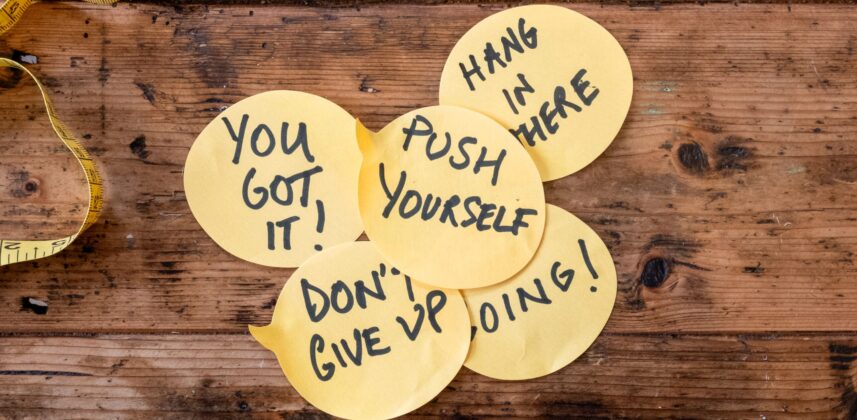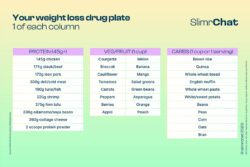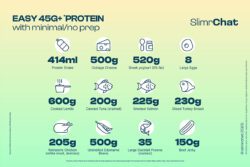How to maintain weight loss after stopping weight loss drugs
Peter Paumgardhen | Last update: 24th October 2025
Reaching your weight loss goal is a huge achievement, but what happens next? Whether you’ve been using weight loss drugs like Mounjaro or Wegovy at some point you’ll likely stop treatment. For many people, this is when the real challenge begins: maintaining progress without the appetite suppressing effects of the drugs.
This guide explores what to expect when the jabs stop and gives you practical, evidence based strategies to help you stay in control of your progress from here on in

What to expect when you stop weight loss medication
Studies and real-world experience of our SlimrChat community show that weight regain is common after stopping weight loss drugs, but not inevitable. Appetite tends to return, cravings may come back, and your old habits may try to creep in. The body may respond by increasing hunger hormones like ghrelin and lowering leptin, which together ramp up hunger and reduce feelings of fullness. Your metabolic rate may also dip slightly.
Experience suggests that individuals who stop weight loss without a transition plan are far more likely to regain the weight than those who adopt long-term behavioural changes. It’s not just about what you eat; it’s how you live.
“Once your hunger returns, the safety net of the medication is gone. The trick is to be prepared for that change, not surprised by it.” Robert Price, Founder, SlimrChat
Golden rules for life after Mounjaro or Wegovy
Let’s get one thing clear: maintenance doesn’t mean going back to your old lifestyle. It means levelling up. These five rules can help you stay in control:
1. Stay structured
Once appetite returns, unplanned eating becomes your biggest risk.
- Stick to three meals per day at regular times
- Build each plate with protein + fibre + healthy fat (see the infographic below)
- Avoid grazing and emotional eating by planning snacks in advance

2. Keep tracking (but don’t obsess)
Tracking doesn’t have to mean calorie counting. Use habit tracking or a visual food diary:
- Photograph your meals and reflect weekly
- Use a hunger/fullness scale to understand your patterns
- Keep a protein log to ensure you’re hitting targets (35–45 g per meal)
3. Make exercise non-negotiable
Exercise isn’t just for weight loss. It protects your muscle, stabilises mood, and helps regulate appetite hormones like GLP-1 naturally.
-
- Aim for 150+ minutes of moderate exercise per week
- Strength train at least twice weekly to prevent lean mass loss
- Focus on building enjoyable routines: walking clubs, dance classes, at-home workouts
Remember: exercise doesn’t mean pounding a treadmill in a gym; it does mean finding things to get you moving and not always taking the easy options
4. Prioritise protein and fibre
These nutrients are still your most powerful allies after weight loss drugs. They promote satiety and help you stay on track:
-
- Protein target: 1.6-2.2 g/kg of target weight, roughly 45 g of protein per meal(around 105–169 g/day depending on sex and height)
- Fibre target: 25-30 g per day, spread across meals
- Make use of high-volume, high-fibre meals to fill your plate with fewer calories
Remember: processed foods are your worst enemy, meals made from fresh food is best


Read our Macronutrients 101 article here
5. Stay part of a community
Support and accountability are critical. People who maintain weight loss long-term are often those who stay socially connected and keep engaging with others.
- Join the SlimrChat forums and take part in shared challenges
- Keep following SlimrChat newsletters or socials for motivation
- Find a health coach, friend or group who shares your goals
“The biggest change was that I finally started asking for help, instead of assuming I had to do it all on my own.”
Diet tips to maintain results
Create a maintenance mindset
- Avoid black-and-white thinking (no more “on/off the wagon”)
- Accept fluctuations in your weight – weight is not static
- Build rituals that support you during high-risk times (e.g. evening snacking) For example:
| Old Habit | New Ritual |
| Flopping on the sofa with snacks and TV | Do a 5-minute tidy-up or stretching session before sitting down |
| Opening the fridge every time you walk into the kitchen | Keep the kitchen ‘closed’ after dinner – dim the lights, close the door |
| Snacking while scrolling your phone | Make tea, light a candle, or use hand cream — engage a different sensory routine |
| Associating Netflix with crisps | Try herbal tea, sugar-free gum, or something to keep your hands busy (fidget toy, knitting, crossword) |
| Using food to unwind | Replace it with a relaxing bath, meditation app, a walk, or journaling for 5 minutes |
Remember: Rituals are more powerful than rules. Don’t just ‘try not to snack but build other habits to do instead.
If you do snack, make sure you have healthy natural snacks (e.g. fruit, nuts) and not bags of crisps, cakes, chocolates etc!
We recommend continuing to plan meals weekly and stick to a routine, even if you feel ‘normal’ again.
Build your meals like you’re still on treatment
- Use high-protein breakfasts to reduce hunger later in the day
- Keep ultra-processed food out of easy reach
- Use batch cooking and prep to reduce decision fatigue
Many place a lot of value of mindfulness in eating: sit down to eat, chew slowly, and reflect on fullness cues
Use positive reinforcement
Don’t just focus on weight. Track energy levels, sleep quality, confidence, mobility, or even skin health. These improvements are often more motivating than the number on the scales.
What to avoid: Traps after stopping weight loss drugs
❌ Thinking you’re ‘cured’
Weight loss drugs helped you – but your habits and will power will sustain you. Maintenance is active.
❌ Crash dieting or restriction
Drastically cutting calories can backfire, causing bingeing, fatigue, or loss of lean mass. Focus on nourishment.
❌ Reintroducing trigger foods too fast
If certain foods tend to spiral into over-eating, phase them back slowly. Build up your tolerance while staying aware.
❌ Isolating yourself
Accountability is the number one differentiator for weight loss maintenance. People who regain often do so alone.
In summary:
- Expect hunger and cravings to increase after stopping treatment. This is totally normal
- Stay structured with meals, movement and mindset
- Prioritise protein and fibre to feel full and strong
- Build community and accountability. Don’t go it alone
- Avoid extreme diets, old habits and over-reliance on willpower
A final word from SlimrChat
Weight loss drugs like Mounjaro and Wegovy can be powerful tools, but they’re just the beginning of your journey, not the end.
They help you lose weight, reset your eating habits, and build a better relationship with food. But once you stop, it’s up to you to keep that momentum going. That doesn’t mean doing it all alone. It means embracing the new habits, energy and confidence you’ve gained, and continuing to build on them.
You’ve already done the hard part. Now it’s about doing the real part, the part that lasts.
Stay connected through SlimrChat for support, tips, tools, and real talk from people on the same path. You’re not alone, and you’ve got this.